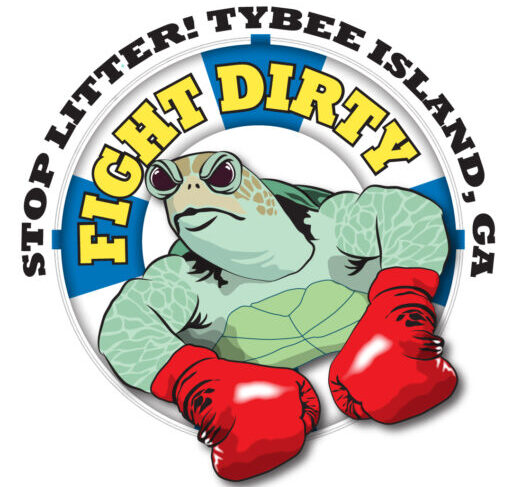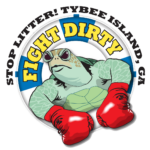The sun and the tide were high, and they made the conditions challenging for the two volunteers pulling discarded bottles and cans from the salt marsh just beyond the entrance to Tybee Island one afternoon last week.
Island residents Monty Parks and Kathryn Propst had to pull out their extended grabbers and nets to reach their target – heaps of plastic, Styrofoam and aluminum that floated just out of arm’s reach in the marsh.
“I think Styrofoam is the worst,” Propst said, as she hoisted another bottle from the marsh with her grabber. “It just breaks down into smaller and smaller pieces. … Plastic bags are the same way. They stay in the sun too long and they disintegrate.”
Despite the merciless humidity, Propst and Parks pulled every visible piece of discarded trash from their designated section of marsh within the span of an hour. Included in their haul: aluminum beer cans, plastic water bottles still filled with fresh water, drink cozies, tennis balls and large chunks of Styrofoam and plastic that appeared to have come loose from a boat.
Once the removal was finished, the pair dutifully counted and categorized the items they collected before Parks hauled it away in his pickup truck. He said most of it would was destined for proper disposal, either through the trash or recycling. The tennis balls, he said, would go to Bo, his dog.
Their effort on that hot Wednesday is part of a new cleanup initiative on the island. Like many volunteer groups on Tybee, the work of the group, dubbed the Marshtenders, began organically with one volunteer – Parks – tackling one small area of marsh at a time.
But he said more volunteers like Propst are pitching in to help him achieve the group’s ultimate goal – removing 14,000 pounds of smothering trash and debris from the salt marsh surrounding Tybee.
“It takes about 2 pounds of trash to smother a half square foot of marsh, preventing plant growth and marsh life from developing,” said Parks, who stressed that although he’s a Tybee city councilman, his work in the new volunteer group is not politically motivated, nor is the group a certified nonprofit. The point or Marshtenders, he said, is to cut back on the trash, which, he said, is finding its way into marsh life and causing an overall decline in the marshes.
Why the marsh?
“Because this is where the shrimp, the small crabs, the fish get their food,” Parks said. “This is where the food chain starts.”
The Tybee Clean Beach Volunteers
A few days later, about a mile and a half way from where the Marshtenders worked, another dozen or so volunteers grabbed bright green buckets and a grabbers and headed out onto the sand at Tybee’s 3rd Street beach access.
Tybee resident Tim Arnold greeted the volunteers as they approached and gave the first-timers a quick overview of the work. They’d be tackling the equivalent of about five blocks of beach, he said, picking up anything that doesn’t belong – cigarette butts, bottles, cans – and bringing them back, either for repurposing or disposal.
Like the Marshtenders, this group, the Tybee Clean Beach Volunteers, began a little more than a year ago with just one volunteer: Arnold.
“I live on Tybee because I want to be on the beach every day,” he said, standing by the Clean Beach Volunteers golf cart as he waited for more people to arrive at Sunday’s cleanup. “I get out there and I just get disgusted and furious, and I don’t know what to do about it. So the natural instinct is to pick it up.”
He said the work began as a side project on his regular walks with his wife. But before long, Arnold said he’d crossed paths with like-minded individuals who felt the same sense of outrage on their own beach strolls. And the group has continued to grow.
Last week, Whitemarsh Island resident Courtney Swope brought her kids, Cecelia, 3, and Cole, who is almost 2, to their first cleanup. Swope said she learned about the Tybee Clean Beach Volunteers at Tybee’s annual Community Day a few weeks prior. It was important to her to bring the kids, Swope said, as they rested on a swing after a good hour of cleaning, so they could learn about keeping their environment clean.
Mary Rogers, a regular clean beach volunteer and Thunderbolt resident, feels a similar devotion to the beach. Once a Maryland resident who lived far from the coast, Rogers said she enjoys coming to Tybee and she’s found in the volunteer group a good justification for her regular beach visits.
Another transplant, Vickie Nylander, said she, too, found about the volunteers at Community Day, and decided she wanted to get involved. Not yet a pro with the grabber, Nylander, who works as a nurse in Savannah, pulled out medical gloves and grabbed the trash by hand.
“We like Tybee,” Nylander said after the sweep Sunday. “We wanted it to stay clean.”
Arnold said that during the past year, the Tybee Clean Beach Volunteers has become a tax exempt nonprofit organization and received a grant from Georgia Power to supply as many as 100 volunteers with the buckets and grabbers they need to clean the beach.
The group, which has grown to about 60 volunteers, has conducted beach sweeps with local companies, worked with the Marshtenders, and overseen groups sentenced to beach cleanups for community service. Under the litter reduction initiative “Fight Dirty Tybee,” the volunteers have also sponsored message benches and a billboard.
Arnold said the Clean Beach Volunteers also regularly count and categorize the trash they collect, which they combine with the data from the marsh cleanups. The most recent count on the group’s website shows that the Tybee Clean Beach Volunteers have removed more than 50,000 cigarette butts and thousands of other plastic, Styrofoam or paper products.
“There’s so many people that want to do it,” Arnold said. “I didn’t know there was a passion on Tybee to pick trash up, but there is. Dozens of people come out to these things, and they’re happy to do it.”
The scientific evidence
If these volunteer groups ever wonder if they’re having an effect on the problem, researchers at the University of Georgia’s Skidaway Institute of Oceanography say the answer is a resounding “Yes.”
Jay Brandes, a Skidaway professor and researcher who was recently awarded a Georgia Sea Grant to study the effects of microplastics along the Georgia coast, said that previous studies have determined that the area of the Georgia coastline closest to Tybee Island and Savannah is far more inundated with trash than other, less populated areas. The larger human populations create larger volumes of waste, he said, which in one way or another makes its way in large quantities to the marshes and the ocean.
“There’s a huge amount of trash out there. There are places that are focal points, that take as much attention as we can possibly get and I think (volunteers), by and large, do a pretty good job at that,” Brandes said. “I have a great deal of admiration for people who are willing to take their time and clean up. They do make a difference.”
Both Brandes and his colleague, Dick Lee, a professor emeritus at the Skidaway Institute, agree that plastic is the most pervasive problem.
Lee said that rather than break down completely, plastic that finds its way into the coast’s tributaries and marshes only gets smaller and smaller and it’s just about everywhere.
In addition to the beaches on Tybee, Lee said, researchers have found microfibers from plastics on the more remote local beaches, like St. Catherine’s, Sapelo and Cumberland islands, and inside the stomachs of marine life.
In his recent studies, Brandes said he has discovered that the smaller the plastic gets, the easier it becomes for fish and shrimp to eat, and the harder it is to get rid of. He recalled a trip he made once to Tybee’s south beach with a group of teachers in tow. It wasn’t long after a volunteer beach sweep, he said, and the beach looked clean.
“We just collected what looked like nice, clean beach sand,” Brandes said. “We went to the laboratory, separated out the minerals … and it was full of plastics. This was perfectly ordinary beach sand, but with little pieces of plastic that had come from larger things – fishing lines, cups and things like that. That was one thing that really struck me and it struck the teachers, too. We found it in every single sample.”
Aside from not using it at all, the best way to stop the plastic from reaching that point, Brandes said, is for the volunteer groups to remove the plastic before it dissolves into smaller pieces and becomes all but impossible to remove.
In the case of other offenders, like the most commonly found discarded items on Tybee’s beaches – cigarette butts – the researchers agreed that while they will break down eventually, they still pose a problem – namely, they’re gross.
“That breaks down, it’s just there’s so many people throwing it down, they build up,” Lee said. “It’s kind of unsightly, certainly.”
That’s why it’s important, Brandes said, for cleanups to occur. As the litter builds up, it’s important for volunteers to bring the amount back down.
“There’s always a need for more cleanups or cleanups over a larger area,” he said. “And it’s hard work. I don’t want to minimize that at all. But it’s good work. It’s necessary work.”
Find more information about the Marshtenders on Facebook by searching for “Marshtenders.”
You can learn more about the Tybee Clean Beach Volunteers at www.facebook.com/FightDirtyTybee, or at tybeecleanbeach.simpl.com.
GET INVOLVED
The Tybee Clean Beach Volunteers will hold their next beach cleanup at 6 p.m. today at the Chatham Street beach entrance. Look for the golf cart with the Tybee Clean Beach Volunteers banner.
The Marshtenders will hold their next clean up at 9 a.m. Friday at the Lazaretto Creek Boat Launch. Look for the Marshtenders banner.

